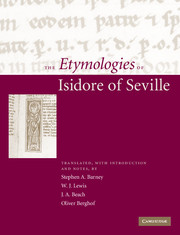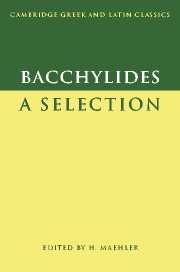The Etymologies of Isidore of Seville
This work is a complete English translation of the Latin Etymologies of Isidore, Bishop of Seville (c.560–636). Isidore compiled the work between c.615 and the early 630s and it takes the form of an encyclopedia, arranged by subject matter. It contains much lore of the late classical world beginning with the Seven Liberal Arts, including Rhetoric, and touches on thousands of topics ranging from the names of God, the terminology of the Law, the technologies of fabrics, ships and agriculture to the names of cities and rivers, the theatrical arts, and cooking utensils. Isidore provides etymologies for most of the terms he explains, finding in the causes of words the underlying key to their meaning. This book offers a highly readable translation of the twenty books of the Etymologies, one of the most widely known texts for a thousand years from Isidore's time.
- A complete English translation of what was the most important encyclopedic text of the Middle Ages
- Provides a comprehensive introduction and notes in order to guide the reader through the text
- Unlocks a core text in the history of culture
Reviews & endorsements
'This extraordinary mix of encyclopaedia and dictionary must be the most historically important work never to have been translated into English until this fine collaborative work.' Spectator
'… with this publication, the whole extraordinary compendium is available to Third Millennium man for the first time ever in equally simple English … [and] glorious contents.' Sunday Telegraph
'… an accurate, literal translation, which contributes significantly to the field of Isidorian studies.' BMCR
'The translation is accurate, the book well produced, and misprints or factual errors are very few indeed.' Rolando Ferri, Bryn Mawr Classical Review
'… we should be delighted that this collaboration has been published by such a distinguished press. The book as a whole is an irreproachable work of translation … all interested in the study of the Middle Ages may certainly rejoice at this important contribution.' Ana-Isabel Magallon, The Medieval Review
Product details
June 2006Adobe eBook Reader
9780511217593
0 pages
0kg
This ISBN is for an eBook version which is distributed on our behalf by a third party.
Table of Contents
- Introduction
- Correspondence of Isidore and Braulio
- The Etymologies: I: Grammar and its parts
- II. Rhetoric and dialectic
- III. Mathematics, whose parts are arithmetic, music, geometry, and astronomy
- IV. Medicine
- V. Laws and the instruments of the judiciary, and chronology
- VI. The order of scripture, cycles and canons, liturgical feasts and offices
- VII. Gods and angels, prophetic nomenclature, names of the holy fathers, martyrs, clerics, monks, and other names
- VIII. Church and synagogue, religion and faith, heresies, philosophers, poets, sibyls, magicians, pagans, gods of the gentiles
- IX. Languages of the nations, royal, military, and civic terminology, family relationships
- X. Certain terms in alphabetical order
- XI. Human beings and their parts, the ages of humans, portents and metamorphoses
- XII. Four-footed animals, creeping animals, fish, and flying animals
- XIII. Elements, that is, the heavens and the air, waters, the sea, rivers and floods
- XIV. Earth, paradise, the regions of the whole globe, islands, mountains, other terms for places, and the lower regions of the earth
- XV. Cities, urban and rural buildings, fields, boundaries and measures of fields, roads
- XVI. Earthly materials from land and water, every kind of gem and precious stones, ivory likewise, treated along with marble, glass, all the metals, weights and measures
- XVII. Agriculture, crops of every kind, vines and trees of every kind, herbs and all vegetables
- XVIII. Wars and triumphs and the instruments of war, the forum, spectacles, games of chance and ball games
- XIX. Ships, ropes, and nets, iron workers, the construction of walls and all the implements of building, also wool-working, ornaments, and all kinds of clothing
- XX. Tables, foodstuffs, drink, and their vessels, vessels for wine, water, and oil, vessels of cooks, bakers, and lamps, beds, chairs, vehicles, rural and garden implements, equestrian equipment.







